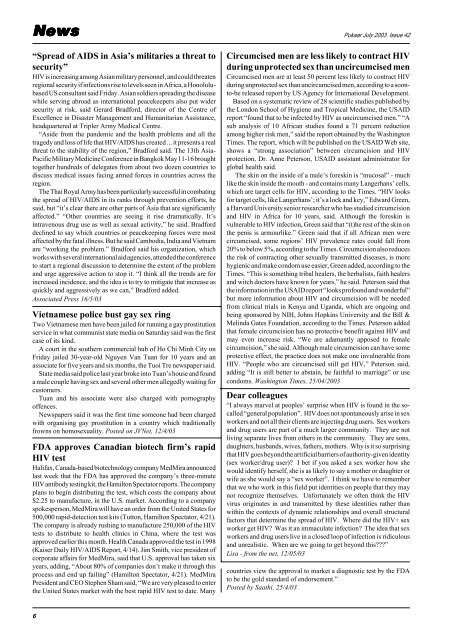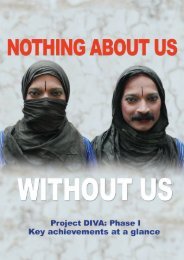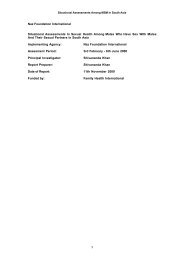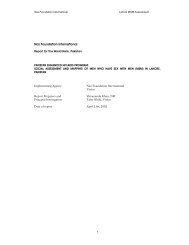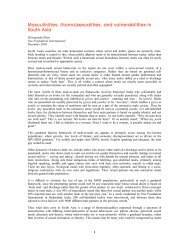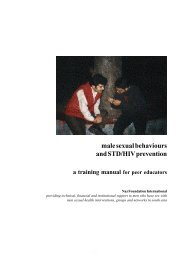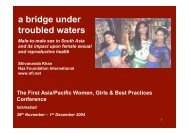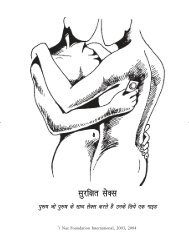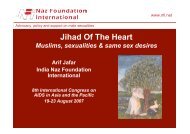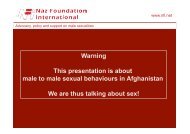Features - Naz Foundation International
Features - Naz Foundation International
Features - Naz Foundation International
Create successful ePaper yourself
Turn your PDF publications into a flip-book with our unique Google optimized e-Paper software.
News<br />
“Spread of AIDS in Asia’s militaries a threat to<br />
security”<br />
HIV is increasing among Asian military personnel, and could threaten<br />
regional security if infections rise to levels seen in Africa, a Honolulubased<br />
US consultant said Friday. Asian soldiers spreading the disease<br />
while serving abroad as international peacekeepers also put wider<br />
security at risk, said Gerard Bradford, director of the Centre of<br />
Excellence in Disaster Management and Humanitarian Assistance,<br />
headquartered at Tripler Army Medical Centre.<br />
“Aside from the pandemic and the health problems and all the<br />
tragedy and loss of life that HIV/AIDS has created ... it presents a real<br />
threat to the stability of the region,” Bradford said. The 13th Asia-<br />
Pacific Military Medicine Conference in Bangkok May 11-16 brought<br />
together hundreds of delegates from about two dozen countries to<br />
discuss medical issues facing armed forces in countries across the<br />
region.<br />
The Thai Royal Army has been particularly successful in combating<br />
the spread of HIV/AIDS in its ranks through prevention efforts, he<br />
said, but “it’s clear there are other parts of Asia that are significantly<br />
affected.” “Other countries are seeing it rise dramatically. It’s<br />
intravenous drug use as well as sexual activity,” he said. Bradford<br />
declined to say which countries or peacekeeping forces were most<br />
affected by the fatal illness. But he said Cambodia, India and Vietnam<br />
are “working the problem.” Bradford said his organization, which<br />
works with several international aid agencies, attended the conference<br />
to start a regional discussion to determine the extent of the problem<br />
and urge aggressive action to stop it. “I think all the trends are for<br />
increased incidence, and the idea is to try to mitigate that increase as<br />
quickly and aggressively as we can,” Bradford added.<br />
Associated Press 16/5/03<br />
Vietnamese police bust gay sex ring<br />
Two Vietnamese men have been jailed for running a gay prostitution<br />
service in what communist state media on Saturday said was the first<br />
case of its kind.<br />
A court in the southern commercial hub of Ho Chi Minh City on<br />
Friday jailed 30-year-old Nguyen Van Tuan for 10 years and an<br />
associate for five years and six months, the Tuoi Tre newspaper said.<br />
State media said police last year broke into Tuan’s house and found<br />
a male couple having sex and several other men allegedly waiting for<br />
customers.<br />
Tuan and his associate were also charged with pornography<br />
offences.<br />
Newspapers said it was the first time someone had been charged<br />
with organising gay prostitution in a country which traditionally<br />
frowns on homosexuality. Posted on JVNet, 12/4/03<br />
FDA approves Canadian biotech firm’s rapid<br />
HIV test<br />
Halifax, Canada-based biotechnology company MedMira announced<br />
last week that the FDA has approved the company’s three-minute<br />
HIV antibody testing kit, the Hamilton Spectator reports. The company<br />
plans to begin distributing the test, which costs the company about<br />
$2.25 to manufacture, in the U.S. market. According to a company<br />
spokesperson, MedMira will have an order from the United States for<br />
500,000 rapid-detection test kits (Tutton, Hamilton Spectator, 4/21).<br />
The company is already rushing to manufacture 250,000 of the HIV<br />
tests to distribute to health clinics in China, where the test was<br />
approved earlier this month. Health Canada approved the test in 1998<br />
(Kaiser Daily HIV/AIDS Report, 4/14). Jim Smith, vice president of<br />
corporate affairs for MedMira, said that U.S. approval has taken six<br />
years, adding, “About 80% of companies don’t make it through this<br />
process and end up failing” (Hamilton Spectator, 4/21). MedMira<br />
President and CEO Stephen Sham said, “We are very pleased to enter<br />
the United States market with the best rapid HIV test to date. Many<br />
Pukaar July 2003 Issue 42<br />
Circumcised men are less likely to contract HIV<br />
during unprotected sex than uncircumcised men<br />
Circumcised men are at least 50 percent less likely to contract HIV<br />
during unprotected sex than uncircumcised men, according to a soonto-be<br />
released report by US Agency for <strong>International</strong> Development.<br />
Based on a systematic review of 28 scientific studies published by<br />
the London School of Hygiene and Tropical Medicine, the USAID<br />
report “found that to be infected by HIV as uncircumcised men.” “A<br />
sub analysis of 10 African studies found a 71 percent reduction<br />
among higher risk men,” said the report obtained by the Washington<br />
Times. The report, which will be published on the USAID Web site,<br />
shows a “strong association” between circumcision and HIV<br />
protection, Dr. Anne Peterson, USAID assistant administrator for<br />
global health said.<br />
The skin on the inside of a male’s foreskin is “mucosal” - much<br />
like the skin inside the mouth - and contains many Langerhans’ cells,<br />
which are target cells for HIV, according to the Times. “HIV looks<br />
for target cells, like Langerhans’; it’s a lock and key,” Edward Green,<br />
a Harvard University senior researcher who has studied circumcision<br />
and HIV in Africa for 10 years, said. Although the foreskin is<br />
vulnerable to HIV infection, Green said that “(t)he rest of the skin on<br />
the penis is armourlike.” Green said that if all African men were<br />
circumcised, some regions’ HIV prevalence rates could fall from<br />
20% to below 5%, according to the Times. Circumcision also reduces<br />
the risk of contracting other sexually transmitted diseases, is more<br />
hygienic and make condom use easier, Green added, according to the<br />
Times. “This is something tribal healers, the herbalists, faith healers<br />
and witch doctors have known for years,” he said. Peterson said that<br />
the information in the USAID report “looks profound and wonderful”<br />
but more information about HIV and circumcision will be needed<br />
from clinical trials in Kenya and Uganda, which are ongoing and<br />
being sponsored by NIH, Johns Hopkins University and the Bill &<br />
Melinda Gates <strong>Foundation</strong>, according to the Times. Peterson added<br />
that female circumcision has no protective benefit against HIV and<br />
may even increase risk. “We are adamantly apposed to female<br />
circumcision,” she said. Although male circumcision can have some<br />
protective effect, the practice does not make one invulnerable from<br />
HIV. “People who are circumcised still get HIV,” Peterson said,<br />
adding “It is still better to abstain, be faithful to marriage” or use<br />
condoms. Washington Times, 25/04/2003<br />
Dear colleagues<br />
“I always marvel at peoples’ surprise when HIV is found in the socalled<br />
“general population”. HIV does not spontaneously arise in sex<br />
workers and not all their clients are injecting drug users. Sex workers<br />
and drug users are part of a much larger community. They are not<br />
living separate lives from others in the community. They are sons,<br />
daughters, husbands, wives, fathers, mothers. Why is it so surprising<br />
that HIV goes beyond the artificial barriers of authority-given identity<br />
(sex worker/drug user)? I bet if you asked a sex worker how she<br />
would identify herself, she is as likely to say a mother or daughter or<br />
wife as she would say a “sex worker”. I think we have to remember<br />
that we who work in this field put identities on people that they may<br />
not recognize themselves. Unfortunately we often think the HIV<br />
virus originates in and transmitted by these identities rather than<br />
within the contexts of dynamic relationships and overall structural<br />
factors that determine the spread of HIV. Where did the HIV+ sex<br />
worker get HIV? Was it an immaculate infection? The idea that sex<br />
workers and drug users live in a closed loop of infection is ridiculous<br />
and unrealistic. When are we going to get beyond this???”<br />
Lisa - from the net, 12/05/03<br />
countries view the approval to market a diagnostic test by the FDA<br />
to be the gold standard of endorsement.”<br />
Posted by Saathi, 25/4/03<br />
6


